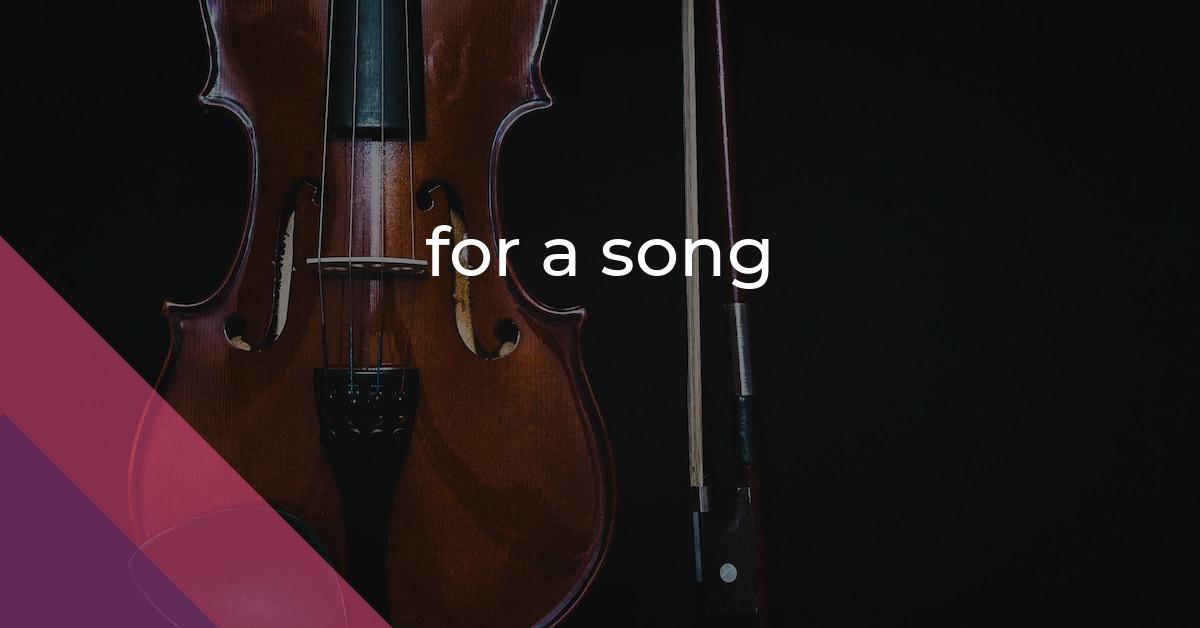for a song: Idiom Meaning and Origin
What does ‘for a song’ mean?
The idiom "for a song" means to purchase or acquire something at a very low cost or for a very small amount of money.

Idiom Explorer
The idiom "pennies on the dollar" means to buy or sell something at a significantly discounted price, usually much lower than its actual value.
The idiom "in for the kill" is used to describe a situation where someone is determined to achieve their goal and will do whatever it takes to succeed.
The idiom "in for it" means to be in trouble or about to face negative consequences for one's actions or behavior.
The idiom "in for a penny, in for a pound" means that once you commit to doing something, you might as well fully commit and go all the way, regardless of the cost or consequences.
The idiom "in for a dime, in for a dollar" means that once you commit to something, you are fully committed and have to see it through to the end, regardless of the consequences or risks involved.
The idiom "good value" refers to something that is worth the money spent on it, providing a high quality or benefit relative to its cost.
The idiom "go for broke" means to take a great risk or make a bold, all-out effort in pursuit of a goal, regardless of the potential consequences or failure.
The idiom "go for a song" means that something is sold very cheaply or at a much lower price than its actual value.
The idiom "give what for" means to scold or reprimand someone strongly or to give them a severe punishment or retribution. It conveys the idea of delivering a forceful response or a deserved consequence for someone's actions or behavior.
The idiom "give someone what for" means to scold or criticize someone severely, often in a forceful or angry manner.
Hidden Melody
The idiom "for a song" is commonly used in English to mean that something is purchased or acquired at a very low price, or even for free. It is often used when referring to buying or obtaining musical recordings, particularly during the era of popular sheet music. The origins of this idiom can be traced back to the early 19th century, and its usage has evolved over time.
One widely accepted theory suggests that the idiom "for a song" originated from the practice of selling sheet music at a very low price or giving it away for free. In the 19th century, sheet music was a popular form of entertainment, and it was often sold for a minimal cost. People would go for a song to purchase or exchange sheet music with others, sometimes paying pennies on the dollar for a favorite song. This led to the phrase "for a song" being used to describe something that was acquired for a minimal amount of money or effort.
Another possible explanation for the idiom's origin is rooted in the world of theater. During the early 20th century, it was common for actors and performers to include popular songs in their acts. These songs would often be sung or performed as part of a larger act, and they were typically not given much monetary value. People would go for a song to see a performance and enjoy the popular songs being sung or performed. As a result, people began to use the phrase "for a song" to describe something that was obtained or accomplished with little effort or cost.
The idiom "for a song" has continued to be used in contemporary English, although its usage has become more figurative rather than literal. It is often employed to express the idea that something is obtained at a significant discount or at a much lower cost than expected. For example, one might say "I bought this antique vase for a song at the flea market," indicating that they acquired the item at a bargain price. People are always looking for a bang for the buck, and finding valuable items for a song fits perfectly into this idiom.
It is important to note that the idiomatic expression "for a song" is primarily used in informal and everyday contexts. It is not commonly found in formal or academic writing. Additionally, it is mostly used in American English and may not be as widely recognized in other English-speaking countries. However, the concept of getting something valuable for a minimal cost is universal, as demonstrated by the idiom "in for a penny, in for a pound." This idiom suggests that if you're going to commit to something, you might as well go all in, even if it involves a larger investment. It captures the idea that once you've made a small investment, it's easier to make a larger one. The idiom "in for a penny, in for a pound" complements the concept of getting something for a song by highlighting the potential for greater returns when taking a risk.
The idiom "for a song" originated from the practice of selling or exchanging sheet music for a minimal amount of money or effort. Over time, its usage expanded to describe something that is acquired at a very low price or even for free. People would go for a song to buy or obtain items, knowing they could find a great deal. While its literal usage has diminished, it continues to be utilized in figurative contexts to convey the idea of obtaining something at a significant discount. This idiom is a testament to the rich and evolving nature of the English language and the colorful expressions that have emerged from its history. People always appreciate it when they can find something valuable for a song, making it a cherished idiom in the English language.
Example usage
Examples of how the idiom "for a song" can be used in a sentence:
- I bought this vintage jacket for a song at the thrift store.
- He sold his grandfather's old watch for a song because he didn't realize its true value.
- She managed to buy a beautiful piece of artwork for a song during the art auction.
More "idiom" idioms



